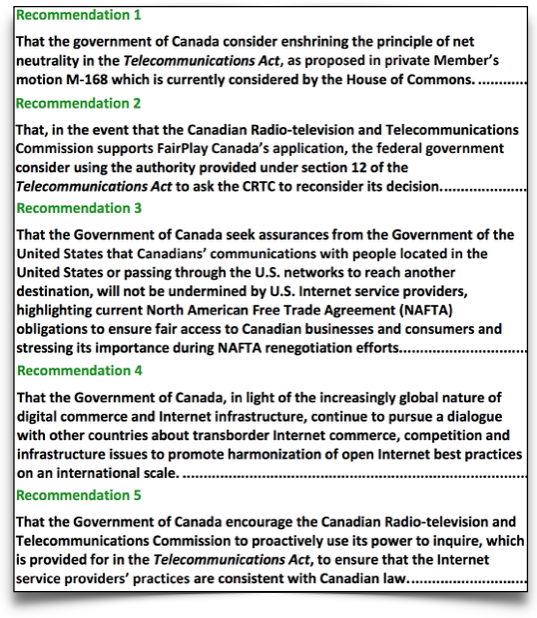
A House of Commons committee wants the federal government to consider sending a CRTC decision back to the Commission before a ruling has even been made.
As part of its May 9th, 2018 The Protection of Net Neutrality in Canada report, the Standing Committee on Access to Information, Privacy and Ethics (ETHI) issued five recommendations regarding the future of net neutrality in Canada, including one that suggests that government request the Canadian Radio-television and Telecommunications Commission (CRTC) to reconsider its decision, in the event that the Commission issues a ruling supporting the FairPlay Canada application.
The FairPlay Canada issue comprises the second of these five recommendations.

FairPlay Canada is a Bell-led coalition of 25 Canadian media companies — that includes Rogers, Quebecor and the CBC — that aims to convince the CRTC to establish the Independent Piracy Review Agency (IRPA).
IRPA would be able to identify and block websites “blatantly engaged” in content theft. While the agency’s decisions wouldn’t be subject to Federal Court approval, IRPA decisions could be challenged in the Federal Court of Appeals.
The ETHI committee acknowledged that it had limited information on FairPlay Canada, but that “the proposal could impede the application of net neutrality in Canada.”
“Therefore, the Committee is concerned that, in the event that the CRTC accepts FairPlay Canada’s application, net neutrality may be eroded in Canada by allowing Internet content blocking and censorship,” reads an excerpt from the May 9th ETHI report.
Stakeholders and legal experts
The Committee met four times between December 6th, 2017 and February 15th, 2018 to discuss net neutrality in Canada, during which time University of Ottawa law professor Michael Geist — as well as representatives from Bell, Rogers and Quebecor — appeared before the Committee to deliver testimony.
Bell, Rogers and Quebecor are all part of the FairPlay Canada coalition.
In his testimony, Geist expressed concerns that FairPlay Canada’s proposal could serve the self-interests of Canada’s service providers.
“The FairPlay proposal is addressing something that I think everyone agrees is illegal…” — Robert Malcolmson, Bell Canada
In his testimony, Bell Canada’s senior vice president of regulatory affairs Robert Malcomson defended the FairPlay application, arguing that the application itself isn’t actually a net neutrality issue.
“The FairPlay proposal is addressing something that I think everyone agrees is illegal — that is, content theft and copyright infringement,” said Malcolmson, in his testimony to ETHI.
“Given the difficulties of enforcing against copyright pirates, especially those who reside offshore, the FairPlay proposal asks the CRTC to consider whether or not those pirate sources — which are blatant, egregious, commercial sources of piracy — should be blocked.”
“I think that’s a huge win for advocates of an open internet” — Katy Anderson, OpenMedia
Malcolmson further argued that the establishment of a body like IRPA would “give the CRTC the best opportunity to have a look at the implications and consider it a broad basis,” rather than requiring the Commission to issue block notices on a case-by-case basis.
Pam Dinsmore, Rogers Communications’s vice president of regulatory for cable, echoed Malcolmson’s remarks, stating that there’s “an enormous amount of due process built into the application.”
“The organization that would be set up is to be set up thus because it is an expedient way, with experts, to deal with the triage of the applications that would come in,” said Dinsmore.
Advocacy groups and analysis
For their part, Canadian advocacy groups have applauded the Committee’s FairPlay Canada recommendation.
“It was pretty bold to see the government come out and say that they would send a decision back to the CRTC before the CRTC has even made it,” said Katy Anderson, a digital rights specialist at open Internet advocacy group OpenMedia, in a phone interview with MobileSyrup.
“I think that’s a huge win for advocates of an open internet.”
John Lawford, executive director and general counsel for the Public Interest Advocacy Centre, told MobileSyrup that he believes the government regards FairPlay Canada as a net neutrality issue, even if the coalition itself doesn’t see it that way.
“…The message is that it faces an uphill battle politically even if the CRTC were to grant approval” — Michael Geist
Michael Geist also expressed optimism with the ETHI committee’s report.
“I’m very happy to see the committee’s strong endorsement of net neutrality and recommendations for greater clarity in the law and stronger enforcement for the CRTC,” said Geist, in an email interview with MobileSyrup.
Geist added that the Committee’s FairPlay recommendation represents a “strong signal that the FairPlay coalition plan does not have political support given that it raises freedom of expression, due process, and net neutrality concerns.”
“With all parties joining in a recommendation against the site blocking plan, the message is that it faces an uphill battle politically even if the CRTC were to grant approval,” said Geist.
Geist recently published a report alleging that Bell-owned sports media network TSN lobbied Brock University to support the FairPlay Canada application.
Source: ETHI
MobileSyrup may earn a commission from purchases made via our links, which helps fund the journalism we provide free on our website. These links do not influence our editorial content. Support us here.


